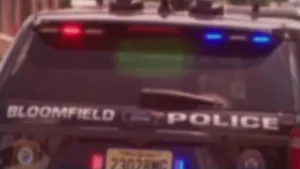More Stories
As it looks to implement reforms, one local police department has adapted a new strategy in its mental health responses.
The Stamford Police Department is evolving and adapting when it comes to responding to mental health calls.
Chief of Police Timothy Shaw says new initiatives defined and created by the police department and the city of Stamford were enacted following protests around Stamford.
"Mental health is a difficult topic for everybody,” says Chief Shaw.
Protests also opened the door for conversation with outside groups and organizations, like the Stamford NAACP. Robert King, the first vice president of the group, says having members of the community work together is key to solving the city’s problems.
King also says the community’s point of conversation with police began after 23-year-old Steven Barrier, who was mentally ill and known to officials, died in Stamford police custody in October 2019. The medical examiner says Barrier died of a heart attack.
MORE: Justice for All
"I can assure you that the Steven Barrier situation was the catalyst that started all of us talking to one another relative to ‘what does a crime scene look like?’ versus ‘a help scene look like,’" says King.
Fast forward to 2021, Chief Shaw says the department has been looking at ways to improve its response to mental health calls and its overall responses. The department has implemented three initiatives to assist people having a mental health crisis. These include:
1.) Collaboration with other outside organizations and providers 2.) Stamford EMS taking the lead on certain 911 calls
3.) A social workers being embedded within the department
"We're evolving to what we think the needs of the community are, but we also know we can't do it alone because we’re not experts in the first of mental health,” says Chief Shaw, acknowledging the department needs to work with outside groups to create change.
News 12 sat down with the police social worker now working alongside officers.
Carolina Grijalba-Rodriguez is a 20-year veteran in the field of social work and a clinical licensed social worker.
Grijalba-Rodriguez is tasked with following up on cases that officers took on the day before and assisting them in the field at times. She handles situations such as suicide attempts, dependency issues and people in a mental health crisis.
"I was expecting to see 80 percent of cases that have to do with crime, but the truth of the matter is that they handle a lot of mental health cases," said Grijalba-Rodriguez.
Change is also happening at the inception of an incident when someone calls 911. Dispatchers dictate which agency to send, based on information the caller provides and deemed to be safe.
"So if it's a case where they just need to be heard, in the past it would be three officers and an ambulance," says Shaw.
"The way I look at it now is you see an ambulance come up, you see two people come out and they talk to the family giving them the resources they need...we're down the road they don't see us," he continues.
Chief Shaw says sometimes a police presence when responding to a mental health call can create anxiety for the person in need - and says their new response resulted in more than a 30 percent reduction in police involvement in mental health calls since January.
Written by Shosh Bedrosian
More from News 12
2:42

‘Very dangerous.’ Bridgeport police detail capture of violent fugitive who was holding woman hostage
2:33

Grieving family urges care when buying prepaid funeral contracts
2:05

‘Every day it’s haunting.’ Search for Norwalk woman’s body hits 40 years
2:12

Unemployment pay for striking workers? CT Democrats say yes, but Gov. Lamont could stand in the way
2:10

Helping heroes: New law could be big boost for Connecticut veterans
3:49
